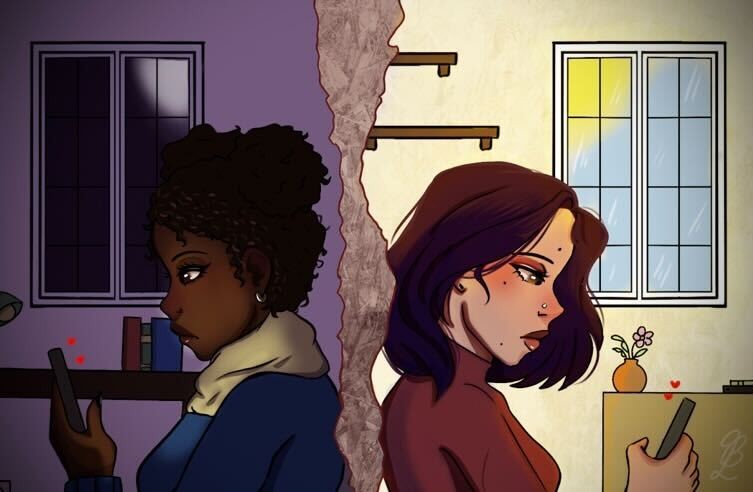OPINION: Your situationship is ruining your life
While it varies from person to person, a “situationship” can be most broadly described as the gray area between two people who aren’t in a labeled relationship but aren’t quite friends either.
March 17, 2023
A few months ago, a friend showed me an instagram post of some couple I vaguely knew. “Look how cute they are. They look so good together,” she said. I agreed. They are cute. I followed our adoration of their cuteness by asking how long they’ve been dating.
“Oh, they aren’t dating. They’re kind of just in a situationship,” she said. She followed it with a mixture of a laugh and uncomfortable smile. I nodded and smiled back. I reassured her that I understood but while doing so I began to feel like I was actually reassuring myself.
While it varies from person to person, a situationship can be most broadly described as the gray area between two people who aren’t in a labeled relationship but aren’t quite friends either. It’s amongst the likes of phrases such as “we’re talking,” “we’re a thing,” or even “we’re snapchatting.” GoogleTrends reports the word hitting an all time high in popularity, as of February 2023. Oxford dictionary describes a situationship as a romantic or sexual relationship that is not considered to be formal or established. The sample sentence below the definition reads, “I’m trying to turn our situationship into something more serious.”
If we aren’t the ones saying it, we’re hearing it – and vice versa. While it is undeniable that relationships, especially in college, can be trying and complex – one cannot help but wonder about the damage done to a generation who can’t learn to commit. Or rather, one that doesn’t want to.
Unfortunately for most of Gen-Z, we have created a culture in which the mere thought of being in something serious is seen as a bind similar to marriage. Instead, most would rather play house and do every single thing people in relationships do – just without the pesky label of boyfriend or girfriend. Herein lies the shiny appeal and short shelf-life of situationships. For a generation who has become accustomed to automated-responses like “I’m not ready,” or “I don’t like labels,” anything else seems almost abnormal. In fact, we can probably count on one hand the amount of people we know who are in labeled, committed relationships. A survey taken in 2022 found that 68% of millennials have been in a relationship while only 34% of Gen-Z can say the same. The statistic is significant and yet not at all surprising.
What happened?
The question isn’t an easy one to answer. The phobia of labels and decrease in dating is a fairly recent and ever-growing epidemic within our age group – its effects resulting in terms like “situationship.” It feels probable that the explanation for this new phenomenon stems from social media and the illusion of choice more than anything else. Through media like dating apps, Instagram and Tiktok, we are oversaturated with beautiful people, places and things at our fingertips. This influx of media and perceived options creates a fantasy world before our eyes, distorting the way we view ourselves and our relationships with other people. Dole out a few more likes, scroll just a little bit longer: there’s always something better out there and your 3,000 instagram followers prove it so. Everyone is interchangeable, just small pixels in a sea of endless and seemingly accessible options. Keep scrolling.
Whether we’re conscious of it or not, this illusion is infiltrating our lives. The idea that there is a better option out there, that the grass is greener somewhere else – it isn’t the truth. This delusion has left us paralyzed and socially stunted, evolving us backwards at rapid speed. A study done by Survey Center on American Life reports nearly one in five American men admitting to not having a single close friend while 59% of men and women are able to identify just one person as their best friend. These statistics counter a culture engulfed with dating apps, influencers and Instagram following. Shouldn’t we feel more connected than ever?
Social behavioral norms made regular through social media like ghosting or Instagram stalking have turned once authentic interactions into a game. We size up meaning through relationships via their spot on our snapchat best friend list or whether we’ve posted together on instagram – something our parents never experienced. While our followers are the highest they’ve ever been, our connections with other people have never been more watered down. In truth, we exist in a state of perceived closeness with the people around us. Perhaps this is why we struggle to form real relationships – we’ve tricked ourselves into thinking we have them all already.
Unfortunately, so much of Gen-Z wants their cake and they want to eat it too. They want the benefits of having a boyfriend or girlfriend – the emotional support, the company and the bonding – without the commitment of actually having the title. It’s easy to get wrapped up in the seemingly beneficial aspects of a relationship like this and even easier to become wrapped up in the pursuit of the next best thing. The truth is, real and meaningful connections, especially in 2023, are not a dime a dozen. The Instagram models you follow don’t know you exist and you cannot swipe right on someone in real life. People are not always interchangeable and there is no substitute for real life relationships and people – especially the romantic ones. While looking at modern relationships through this lens, it’s easy to understand how the “situationships” we so often experience aren’t based in reality. The lack of interest to create a deeper connection doesn’t make the couple on instagram a situationship – it makes them friends. This terminology and culture we have created is not one we need to reassure ourselves is normal or even healthy – the beauty being that we can choose to opt out if we so desire.
Like anything else, there is always a gray area within relationships, especially for college students. We are young, unsure and unaware of exactly what we want. The notion, however, that someone being non-commital is anything other than them being non-committal is problematic, exhausting and harmful to your mental health.
For many of us, the grass is as green as it’s going to get.
Follow Olivia Krupp on Twitter

Olivia is a sophomore studying journalism. She enjoys reading, foreign films, and poetry in her free time.



